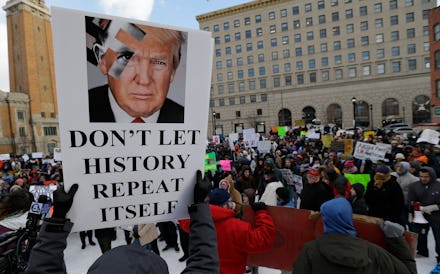Trump Ban Appeal: Latest updates on the fight between Trump and a federal court over the travel ban

By 6 p.m. Eastern Monday, Justice Department lawyers representing President Donald Trump and his government must file their request to lift a temporary embargo on Trump's highly controversial immigration executive order.
The ongoing legal saga began Friday when Federal District Court Judge James Robart in Seattle ordered a temporary restraining order on Trump's travel ban. The plaintiffs are the states of Minnesota and Washington — and Robart, who assessed the case and who Trump subsequently derided, was appointed to the court by former-President George W. Bush.
On Saturday, Washington state Attorney General Bob Ferguson described the ban as "unconstitutional and unlawful."
The Trump camp's response to the order began with a characteristically denunciatory tweet from the president, along with an appeal filed by the federal lawyers fighting to preserve the executive order.
Trump's criticism extended to the system of checks and balances, too, in which the judicial branch exists to hold accountable the legislative and executive (in this case, Trump) branches — and vice versa.
On Sunday, the 9th U.S. Circuit Court of Appeals in San Francisco denied the federal government's appeal, preserving Robart's restraining order.
But the court said it would consider further arguments from both sides, providing a 3 a.m. Eastern Monday deadline for the plaintiffs — which was met — and the aforementioned 6 p.m. deadline for Trump's de facto lawyers.
Trump's executive order, which has sparked nationwide protests, specifically includes a ban on nationals from seven Muslim-majority countries — Iran, Iraq, Libya, Somalia, Sudan, Syria and Yemen — for 90 days and a ban on all refugees for 120 days — with the exception of Syrian refugees, who are banned indefinitely.
Whenever the Refugee Admissions Program resumes, the order directs the government "to prioritize refugee claims made by individuals on the basis of religious-based persecution, provided that the religion of the individual is a minority religion in the individual's country of nationality."
Critics contend this is clearly a way of allowing Christians into the U.S., while making it more difficult for Muslims.
White House press secretary Sean Spicer has insisted the executive order is not a "ban," though Trump has repeatedly referred to it as a "ban" — as recently as Saturday.
Bolstering the plaintiff's arguments were two court filings: an amicus brief Sunday from almost 100 leading Silicon Valley companies and a declaration Monday from 10 top national security officials.
The Silicon Valley companies, which include giants such as Apple, Facebook, Google, Microsoft, Netflix and Twitter, argue that the ban "represents a significant departure from the principles of fairness and predictability that have governed the immigration system of the United States for more than 50 years — and the order inflicts significant harm on American business, innovation and growth as a result."
"[It] will likely feed the recruitment narrative of ISIL and other extremists that portray the United States as at war with Islam."
Concurrently, objections to the ban from top government officials include former Secretaries of State John Kerry and Madeleine Albright, as well as former CIA Directors Michael Hayden and Michael Morell. Among the 10 officials were a former NSA director, national security advisers and a homeland security secretary — they are comprised of both Democrats and Republicans and have served presidents from both parties.
"In our professional opinion, the Order will harm the interests of the United States in many respects," the top officials wrote. Adding, for example, it "will likely feed the recruitment narrative of ISIL and other extremists that portray the United States as at war with Islam."
If the appellate court, after reviewing Sunday and Monday's filings, decides to maintain the temporary embargo on Trump's sweeping immigration ban, the case will very likely end up in the Supreme Court — where Trump is fixing to replace Supreme Court Justice and conservative titan Antonin Scalia with another conservative judge, Neil Gorsuch.